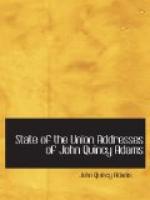It has been, therefore, with some concern that we have observed indications of intestine divisions in some of the Republics of the south, and appearances of less union with one another than we believe to be the interest of all. Among the results of this state of things has been that the treaties concluded at Panama do not appear to have been ratified by the contracting parties, and that the meeting of the congress at Tacubaya has been indefinitely postponed. In accepting the invitations to be represented at this congress, while a manifestation was intended on the part of the United States of the most friendly disposition toward the southern Republics by whom it had been proposed, it was hoped that it would furnish an opportunity for bringing all the nations of this hemisphere to the common acknowledgment and adoption of the principles in the regulation of their internal relations which would have secured a lasting peace and harmony between them and have promoted the cause of mutual benevolence throughout the globe. But as obstacles appear to have arisen to the reassembling of the congress, one of the two ministers commissioned on the part of the United States has returned to the bosom of his country, while the minister charged with the ordinary mission to Mexico remains authorized to attend the conferences of the congress when ever they may be resumed.
A hope was for a short time entertained that a treaty of peace actually signed between the Government of Buenos Ayres and of Brazil would supersede all further occasion for those collisions between belligerent pretensions and neutral rights which are so commonly the result of maritime war, and which have unfortunately disturbed the harmony of the relations between the United States and the Brazilian Governments. At their last session Congress were informed that some of the naval officers of that Empire had advanced and practiced upon principles in relation to blockades and to neutral navigation which we could not sanction, and which our commanders found it necessary to resist. It appears that they have not been sustained by the Government of Brazil itself. Some of the vessels captured under the assumed authority of these erroneous principles have been restored, and we trust that our just expectations will be realized that adequate indemnity will be made to all the citizens of the United States who have suffered by the unwarranted captures which the Brazilian tribunals themselves have pronounced unlawful.
In the diplomatic discussions at Rio de Janeiro of these wrongs sustained by citizens of the United States and of others which seemed as if emanating immediately from that Government itself the charge d’affaires of the United States, under an impression that his representations in behalf of the rights and interests of his country-men were totally disregarded and useless, deemed it his duty, without waiting for instructions, to terminate his official functions, to demand his pass-ports, and return to the United States. This movement, dictated by an honest zeal for the honor and interests of his country— motives which operated exclusively on the mind of the officer who resorted to it—has not been disapproved by me.




